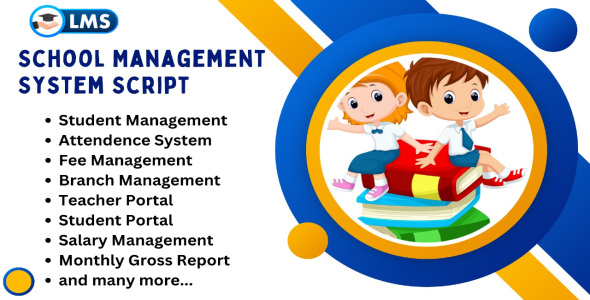
Latest Online School
This School Script allow you to manage for all types of educational institutions like schools and colleges etc. Go To Buy Page
View Demo
learning management system
In the digital age, Learning Management Systems (LMS) have emerged as powerful tools in the realm of education and training. They offer a centralized platform for managing and delivering learning content, tracking student progress, facilitating communication, and administering assessments. This comprehensive guide aims to provide a detailed overview of Learning Management Systems, exploring their features, benefits, implementation considerations, and future trends.
What is a Learning Management System (LMS)?
A Learning Management System (LMS) is a software application or web-based technology used to plan, implement, and assess a specific learning process. It serves as a tool to help plan, deliver, and manage educational content, courses, quizzes, and training materials efficiently. LMS platforms enable organizations to centralize training and development content, manage curricula, track learner progress, and provide a structured learning environment for students and employees.
LMS software can be hosted in the cloud, allowing for remote access and scalability. It combines database management with digital frameworks to handle course scheduling, evaluation tools, regulatory compliance, and more.
Businesses use LMS resources to create, administer, and distribute courses for employee training, professional development, and performance tracking.
Incorporating an LMS into an organization's training programs can lead to reduced employee turnover, increased satisfaction, and improved engagement.
Key Features of Learning Management Systems:
1-Course Management:
LMS allows instructors to create and organize courses, manage course content, and set up learning objectives and outcomes.
2-Content Authoring:
It provides tools for creating, uploading, and organizing various types of learning content, including text documents, multimedia files, quizzes, and assessments.
3-Student Management:
LMS enables instructors to enroll students in courses, manage user profiles, and track student progress and performance.
3-Communication Tools:
It offers communication features such as discussion forums, messaging systems, announcements, and notifications to facilitate interaction between instructors and students.
4-Assessment and Evaluation:
LMS allows instructors to create quizzes, assignments, exams, and surveys, as well as to grade submissions, provide feedback, and generate reports on student performance.
5-Collaboration and Social Learning:
Some LMS platforms support collaboration features like group projects, wikis, blogs, and peer-to-peer interactions, fostering social learning and knowledge sharing among students.
6-Analytics and Reporting:
LMS provides analytical tools to track learner engagement, monitor course effectiveness, and generate reports on various metrics such as completion rates, assessment scores, and learner demographics.
7-Integration and Compatibility:
Many LMS platforms offer integration with other educational tools and systems, such as Student Information Systems (SIS), library databases, content repositories, and external learning resources.
Benefits of Learning Management Systems:
1-Accessibility:
LMS provides anytime, anywhere access to learning materials, allowing students to engage in learning activities at their own pace and convenience.
2-Scalability:
LMS can accommodate a large number of users and courses, making it suitable for both small-scale and large-scale educational institutions or corporate training programs.
3-Efficiency:
LMS automates administrative tasks such as course enrollment, grading, and reporting, saving time and resources for instructors and administrators.
4-Customization:
LMS allows instructors to customize learning paths, tailor content to individual learner needs, and provide personalized feedback, enhancing the learning experience.
5-Data-driven Decision Making:
LMS generates valuable data insights that inform instructional design, curriculum planning, and teaching strategies, leading to continuous improvement in education delivery.
Future Trends in Learning Management Systems:
Mobile Learning and Microlearning:
LMS will continue to evolve to support mobile learning initiatives, delivering bite-sized content optimized for mobile devices and enabling on-the-go learning experiences.
Immersive Technologies:
Virtual reality (VR), augmented reality (AR), and gamification elements will be integrated into LMS platforms to create immersive and interactive learning environments.
Social Learning Communities:
LMS will incorporate social learning features like discussion boards, social networking, and collaborative tools to promote peer-to-peer interaction and knowledge sharing.
Analytics and Predictive Insights:
Advanced analytics capabilities will provide predictive insights into learner behavior, performance trends, and learning outcomes, enabling data-driven decision-making in education.
&l
